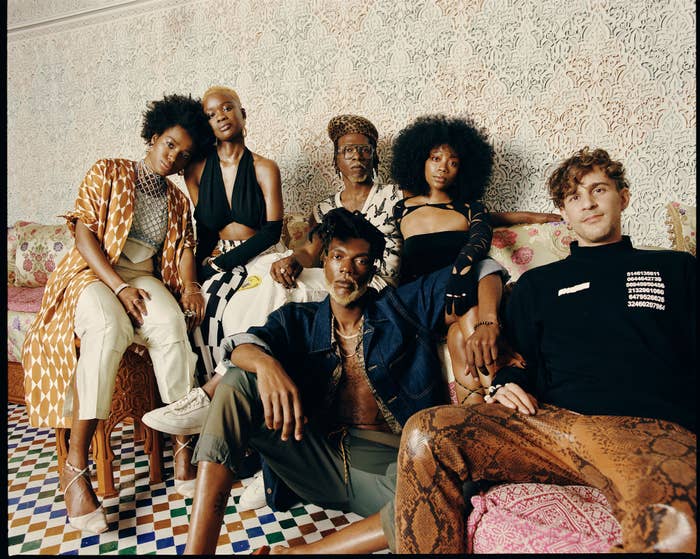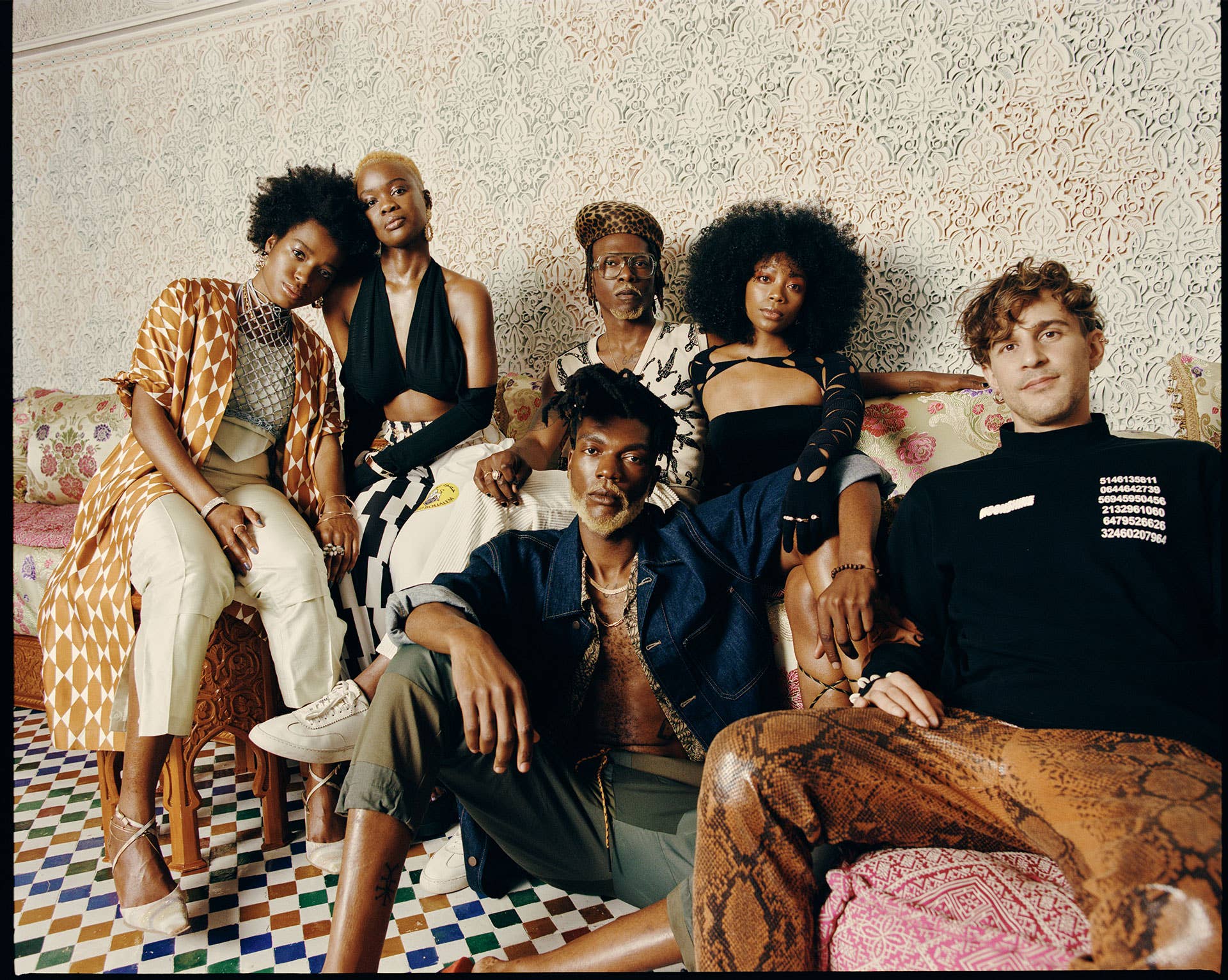
A mysterious SMS lights up your phone. Don’t worry, it’s the opposite of spam. It beckons you to a party that’s not only exclusive but tailored for people like you. And that’s even more meaningful after all the clubs and late-night bashes you’ve been to, never once feeling seen. So goes the uniquely heartening experience for new attendees of Moonshine, a monthly all-nighter (put on hold by the pandemic) designed to be far more inclusive than other happenings in its native Montreal, and beyond. Founded seven years ago by Juno-nominated musician Pierre Kwenders and childhood friend Hervé “Coltan” Kalongo—both Montrealers of Congolese decent—the monthly post-full moon party pops up at surprise locations that regulars are informed about via SMS. San Farafina, a Montrealer of Haitian and Filipino descent (Fara for short), became one of the DJs that transfixed Moonshine crowds with eclectically international rhythms, intertwining the spirit of each beat with her partner Kalongo’s eye-catching visuals and fashionable Moonshine merch.
As these parties flourished beyond Montreal, with stops in the U.S., Europe, and Africa, so too have the other mediums that Moonshine is lighting up. SMS For Location, Vol.4(due June 18) is the latest in a series of the collective’s albums, curated by Kwenders, Kalongo and Farafina, featuring contributions they recruited while globetrotting for each party. Vol.4’s impressive roster includes Kwenders, Boddhi Satva, Montreal’s Nate Husser + Kris The $pirit, Toronto’s Uproot Andy, London’s Ahadaream, and, most impressive of all, Grammy nominee and critical darling Georgia Anne Muldrow. She sings on the summery yet soaring single SMS For Location, Vol.4 single “Onward,” which was produced by esteemed Seattle DJ Sango and debuted on Friday.
“They are so cool. I hope to align with them a little bit closer,” Muldrow tells Complex of working with the burgeoning Moonshine Collective. “I just love the fact that these are some Congolese folks doing their thing worldwide. It’s just amazing.”
Below Farafina, Kalongo (who oversees the creative direction of Moonshine, from the rave events to the merch) and Kwenders tell us more about working on music and a documentary in the Congo, how their humble house parties grew into can’t-miss international events, and how they ensured COVID wouldn’t dim Moonshine’s shine.
So, Ms. Muldrow told us: “The song I did with Sango took a great deal of patience from Moonshine. Because I kept saying ‘This just ain’t sounding right. I’m trying too hard.’ I just wanted it to be right, because I believed in the potential of the song. And then I finally just said: ‘You know what? This is it. I have to detach. It’s done, and let me know what you think.’ And the reception of everyone at Moonshine loving it taught me a very big lesson about flow, and letting something come out of you that’s real. I was like ‘Look at this! This whole time, I was trippin!’”
San Farafina (Fara): I only got to experience the final product. To hear about her process adds another layer. I’m looking forward to hearing the song again and thinking about what she went through making it. Thank you for sharing that.
Pierre Kwenders: It was an honour to have her on the track with Sango, another artist we love at Moonshine. The beauty of that song is you have him coming from an electronic, DJing, nightlife world. Then you have Georgia, who has that soul in her voice, and can take anything anywhere. And when we were sent the song, it was everything I didn’t expect, in a good way. And the message in the lyrics is so beautiful.
It’s a long way for you to come—from hosting afterparties in Montreal, to coordinating continent-hopping events, to collaborating with a living legend like Ms. Muldrow. How did all this begin?
Hervé “Coltan” Kalongo: Pierre and I grew up in the same Montreal neighborhood, Cartierville. We refer to it as “six four,” and if you pay attention, you’ll see and hear references to that in our work. Our parents know each other, and we’d bond over African stuff.
We started this gathering in a loft where I lived downtown. Since we didn’t feel represented in the music played in clubs, we wanted to listen to some African electronica. Pierre jumped up and, I can’t call it DJing because he was just playing songs off YouTube at first. But they were great parties.
Slowly that became Moonshine. People started forming around it, and loved the vibe. Fara is my partner, and she joined. We had this openness with friends, to try stuff. And that’s why it’s lasted seven years.
Fara: Before, we’d pay $40 to get into afterparties or raves. And they’d only be okay. We’d end up heading back to Hervé’s place near the Old Port just to listen to Azonto in the kitchen.
I remember that growing into something more, and then when we decided on the name Moonshine, and to have more official parties that weren’t so focused on techno.
“It was therapeutic for everyone to see each other, dress up really nice, maybe even bump into Kaytranada or Klassified, and just see everyone at the same level. None of the stuff that makes clubbing so superficial.”
Pierre: Not there’s anything wrong with techno. But we needed to have a place where there were no restrictions on the music, and how we wanted to dance. We needed a place that felt like a family party. That’s why Moonshine feels like a place to have fun and enjoy good music, and enjoy the love we have for each other.
Hervé: We’ve been going out forever. And we never thought we’d get the love we deserved in a club, where you’ll see dancers get disrespected by bouncers. So we wanted to change the whole vibe with Moonshine. And not have it too often, just once a month to make it special, rather than the typical business model where you need to have it once a week. Just do it for fun. That resonated with people. It was therapeutic for everyone to see each other, dress up really nice, maybe even bump into Kaytranada or Klassified, and just see everyone at the same level. None of the stuff that makes clubbing so superficial.
Pierre: And everyone loves a little mystery. At the beginning of Moonshine, the SMS for the party’s location was Hervé’s number. Through the years we worked with others in the collective to make a system to communicate with all the attendees. There’s that direct connection, the person who is texting is actually talking to an organizer. Texting and not knowing the place or what it’s going to look like. Texting and not knowing who will perform. We love to play with those things, and people enjoy it. That way, we can spice it up every time.
Fara: It became a community of people feeling represented. We’d get more and more DJs popping up, playing different sounds. And other events would build off ours. The response has been very positive.
So what have been some of the best texts you’ve received in this mystery network of yours?
Hervé: We usually don’t have a Moonshine event in December, because of the holidays. So we’ll get selfies of people wishing us “Merry Xmas.” Which is cute. Or we’ll get texts warning us there are cops around during Moonshine. Not that we have anything to hide, but it always changes the vibe after seeing a cop, so we appreciate those.
Fara: And pre-drinking pics!
Hervé: We still get selfies like those during the pandemic and lockdown, asking us “When are you guys back?” I tell them: “Ask God!”
Pierre: Yes! This has been dragging on for a year and a half now.
What has it been like to keep Moonshine going during a pandemic?
Hervé: Our goal has been to tell the same story through different mediums. So about four years ago we made our label structure coincide with our clothing. The pandemic has put a stop to about 80 percent of our activities, yes. But at the same time, we started other projects previously. So it’s just a new challenge.
Fara: We’ve always diversified—we’re a label, we’re working on a documentary too, and not just events. Now that we have more time on our hands, we’ve been able to develop those other areas.
What’s the documentary about?
Fara: We were in Congo four months ago, meeting other creatives, trying to make that connection that has been a dream for Pierre and Hervé, who were born there. So it was a homecoming. We connected with artists from different scenes, had an event there, and explored the way some of these artists use technology and art, and how that shapes an emerging arts scene, an emerging Africa.
“Everywhere we went, we just tried to create a safe space for the kind of music we like, and give people access that don’t usually have it.”
It’s amazing that you’ve been able to branch out so far. How did Moonshine go global?
Hervé: It happened organically. From the beginning it was an international event for Montreal, with music from Angola, Chile, the Congo, and more. So it only made sense to connect with creators who like the same things as us. It wasn’t as if African electronica was being played everywhere, so just us defending the genre made us special, which made it easy to knock on doors.
Pierre: It was all about building relationships. During the first three years, we invited artists we loved to play Moonshine parties in Montreal. In 2016, we did a collab with multidisciplinary artist Foreigner, an artist in L.A. Or maybe it was 2017.
Hervé: I think it was 2017.
Pierre: I can’t remember—2020 fucked everything.
Fara: I swear!
Pierre: Whenever it was, it went well. And now Foreigner is one of our primary collaborators. And we play music from South America, which led to an opportunity to go to Chile. We did two Moonshines there, which opened doors in so many ways. And then everywhere we went, we just tried to create a safe space for the kind of music we like, and give people access that don’t usually have it.
And how does the mixtape series capture the essence of those parties?
Fara: It reflects the diversity of our events—you might hear something on the techno side, but also an MC track, or a straight up Afro sound, or some Amapiano beats.
Pierre: This latest mixtape has so many members of the Moonshine family from across the world. It’s a family gathering, like our events.
Hervé: And it has a cohesiveness, you can hear a story being told. From the beginning of the event at 11 pm, until five in the morning when you’re exhausted but remaining on the dancefloor—you can hear that arc happening on this mixtape.
How does it feel to create that all-nighter experience on the mixtape, especially because COVID lockdowns have kept the Moonshine family apart?
Fara: Many of these artists can’t get out and perform. So it’s very cathartic to have this music to work on. And because a lot of work, and I mean a lot, goes into putting on Moonshine events, we could divert that energy to other projects like the mixtape, the documentary and our merch during the pandemic.
Hervé: On top of that—no matter what happened with COVID, we were determined to make this project happen. We didn’t have much money left last year, so we just decided to take whatever was left and go to Congo, and finish what we could. Yes, COVID is there, but we wanted to tell a story of resilience, and just go for it.



